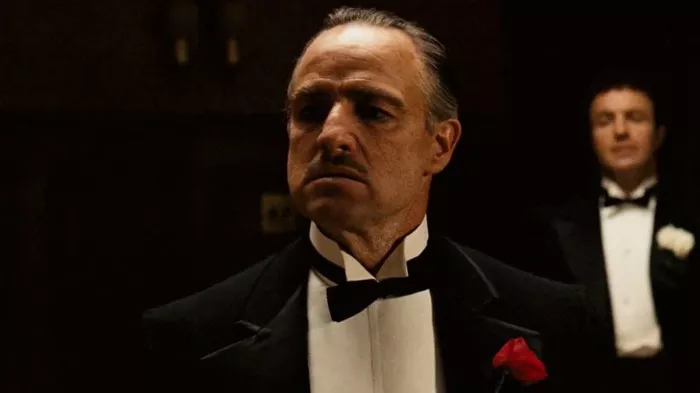In the annals of cinematic history, “The Godfather” stands as an immortal masterpiece, a film that not only redefined the gangster genre but also showcased stellar performances from an ensemble cast. As audiences revisit the Corleone family saga, one question often surfaces—Who Was The Highest Actor In The Godfather? This exploration delves into the financial dynamics behind the making of this cinematic epic, unveiling the leading earner and shedding light on the intriguing world of Hollywood contracts during a pivotal era.
I. The Godfather’s Ensemble Cast: A Symphony of Talent
1. Marlon Brando’s Stipulations: The Art of Negotiation
At the helm of the cast was Marlon Brando, the legendary actor cast in the iconic role of Don Vito Corleone. Brando, known for his meticulous approach to roles, brought a level of authenticity and depth to the character that remains unparalleled. However, his negotiations for the role were marked by stipulations that went beyond financial compensation, including a percentage of the film’s profits—an unconventional demand that would later become a precedent for other actors.
2. Al Pacino and James Caan: Rising Stars with Negotiation Power
While Marlon Brando’s negotiation tactics set a distinctive tone, rising stars Al Pacino and James Caan also negotiated favorable deals for their roles as Michael and Sonny Corleone, respectively. As actors on the brink of stardom, they recognized the potential impact of their performances in “The Godfather” and sought compensation that reflected their rising status in the industry.
II. The Contractual Landscape: Points, Percentages, and Profit Participation
1. Brando’s Unique Deal: A Percentage of the Pie
Marlon Brando’s contract for “The Godfather” included a unique provision—an unprecedented percentage of the film’s profits. This innovative approach to compensation marked a departure from the traditional fixed salary model and gave Brando a direct stake in the financial success of the film. The decision initially met with skepticism, ultimately became a shrewd business move as “The Godfather” went on to become a box office sensation.
2. Al Pacino’s Deferred Salary: Believing in the Project
Al Pacino, despite being a relative newcomer, negotiated a deferred salary for his role as Michael Corleone. This arrangement meant that a significant portion of his earnings would be tied to the film’s financial success. Pacino’s belief in the project and its potential impact on his career led him to make a strategic decision that would pay off handsomely as “The Godfather” became a cultural phenomenon.
III. The Financial Impact: Beyond Salaries to Box Office Triumph
1. Brando’s Share of Success: The Profitable Gamble
Marlon Brando’s unconventional deal turned out to be a profitable gamble. As “The Godfather” achieved unprecedented success at the box office, Brando’s percentage of the profits translated into substantial earnings, further solidifying his status as a Hollywood icon. The film’s financial triumph became a testament to the power of innovative contract negotiations.
2. Al Pacino’s Career Catapult: A Strategic Investment
For Al Pacino, the decision to defer a portion of his salary in favor of a share in the film’s profits proved to be a strategic investment. As “The Godfather” propelled him to stardom, Pacino’s financial gains went beyond the immediate paycheck, establishing him as a bankable actor and paving the way for a career marked by acclaimed performances and financial success.
IV. Legacy and Lessons: The Godfather’s Impact on Hollywood Contracts
1. Brando’s Trailblazing Influence: Shaping Contractual Norms
Marlon Brando’s groundbreaking deal for “The Godfather” left an indelible mark on Hollywood’s contractual landscape. The success of his profit participation model set a precedent for A-list actors negotiating a share of a film’s financial success, a practice that has since become common in the industry. Brando’s business acumen not only secured his financial legacy but also influenced how actors approached compensation negotiations.
2. The Godfather Effect: Elevated Expectations in Hollywood
“The Godfather” not only changed the trajectory of Marlon Brando and Al Pacino’s careers but also elevated expectations for actors negotiating their contracts. The film’s financial success highlighted the potential rewards of profit participation, leading to a shift in the industry’s compensation norms. Actors began to view their roles not just as artistic endeavors but as potential financial investments with long-term returns.
Conclusion: The Godfather’s Financial Legacy in Cinematic History
In conclusion, the question of “Who Was The Highest Actor In The Godfather?” goes beyond the traditional understanding of salaries. Marlon Brando’s innovative contract, incorporating a percentage of the film’s profits, redefined the financial dynamics of Hollywood and left an enduring legacy. His strategic approach to compensation, coupled with rising stars like Al Pacino recognizing the value of profit participation, set a precedent that continues to shape how actors negotiate their contracts in the film industry.
“The Godfather” not only stands as a cinematic masterpiece but also serves as a financial landmark in the history of Hollywood contracts. As audiences revisit the Corleone family saga, they are reminded not only of the artistic brilliance on screen but also of the strategic decisions and financial innovations that contributed to the film’s enduring legacy in the annals of cinematic history.

